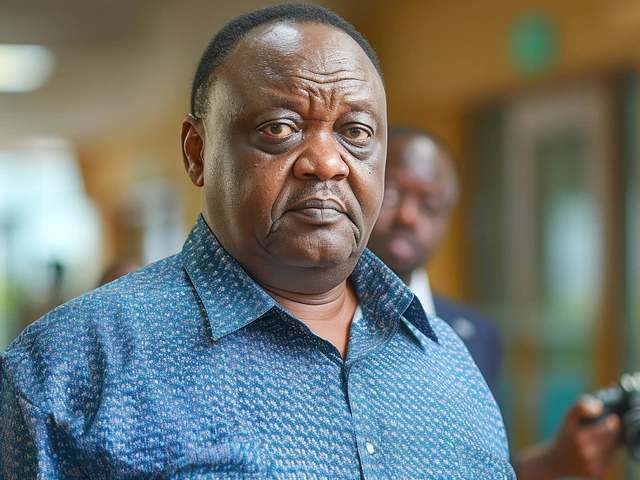Border Incursion Sparks Tense Military Response
In a significant reminder of the fragility of peace on the Korean Peninsula, South Korea's military fired a barrage of warning shots after detecting a border incursion by North Korean personnel. This incident, which transpired over the weekend, saw an unspecified number of North Koreans cross the Military Demarcation Line (MDL) in the eastern sector of the Demilitarized Zone (DMZ), prompting a swift and calculated response from the South Korean army.
The Military Demarcation Line serves as the de facto border between North and South Korea, running through the DMZ. This zone, created in 1953 as part of the armistice agreement that paused the Korean War, stretches approximately 250 kilometers and is rigorously guarded by both nations. Incursions are rare but highly provocative, raising the potential for escalated military responses if not quickly contained.
According to South Korean military sources, upon detection of the breach, forces stationed in the area responded with about 90 rounds of warning shots from 20mm cannons, ostensibly aimed at fortifying the boundary and discouraging the North Korean presence. While no casualties were reported, the act itself is a stark representation of the ongoing tensions that continue to simmer despite multiple rounds of diplomatic negotiations seeking to ease hostilities.
The South Korean military's immediate response reflects a broader strategy of maintaining vigilant border defenses and ensuring territorial integrity. Military officials emphasized the importance of readiness and stability, noting that any breach, regardless of scale, necessitates a robust security response to avert potential escalations. The DMZ, despite its designation as a buffer zone, remains one of the most fortified and monitored areas in the world.
Historical Context and Modern Diplomacy
The Korean Peninsula's history is marred by division and conflict, dating back to the conclusion of World War II. The Korean War, which began in 1950, saw massive engagements between the communist North, supported by China and the Soviet Union, and the capitalist South, backed primarily by the United States and United Nations forces. The armistice in 1953 halted active hostilities but did not lead to a peace treaty, leaving the peninsula technically in a state of war.
Over the decades, numerous incidents have punctuated the tense relationship between North and South Korea. From military confrontations and espionage to the North's pursuit of nuclear weapons, these clashes underscore the deep-seated antagonism. However, there have been periods of thawing relations marked by summits and agreements aimed at denuclearization and reconciliation.
In recent years, efforts spearheaded by South Korean President Moon Jae-in sought to establish a more stable and peaceful coexistence between the two Koreas. High-profile summits between North Korean leader Kim Jong-un and prominent international figures, including former U.S. President Donald Trump, marked a significant shift towards dialogue. Despite these efforts, fundamental disagreements, particularly regarding denuclearization and sanctions, have often resulted in stalled progress and renewed tensions.
Regional and International Implications
The border incident also holds broader regional implications. South Korea's allies, particularly the United States, have historically underscored the importance of a strong defensive posture against North Korean provocations. The U.S. maintains a significant military presence in South Korea, with around 28,500 troops stationed as a deterrent against potential aggression. This military collaboration underscores the strategic importance of the Korean Peninsula in broader geopolitical dynamics.
Moreover, North Korea's behavior is closely scrutinized by neighboring countries, including Japan and China, each with vested interests in regional stability. Japan, in particular, has expressed concerns over North Korea's missile tests and potential threats to its national security. China, North Korea's primary ally and economic lifeline, consistently advocates for stability while navigating its complex relationship with both Koreas.
International bodies, including the United Nations, also monitor the situation on the peninsula. Resolutions and sanctions imposed in response to North Korea's nuclear activities aim to curb the country's capabilities while encouraging diplomatic solutions. The delicate balance between deterrence and diplomacy remains a core component of international efforts to address the Korean conflict.

A Persistent Challenge Amidst Diplomatic Efforts
Despite ongoing diplomatic efforts, the recent border incursion highlights the persistent challenges in achieving lasting peace on the Korean Peninsula. The South Korean military, armed with both vigilance and a readiness to respond, underscores the need for robust security measures alongside diplomatic endeavors. Each incident serves as a reminder of the fragile peace and the complexities involved in fostering long-term stability.
For the Korean Peninsula, the road to reconciliation is fraught with obstacles. From historical grievances to contemporary geopolitical tensions, each step towards peace requires concerted efforts from both Koreas and the international community. While the immediate response to border breaches serves as a necessary defense, the overarching goal remains the establishment of a peaceful and unified Korean Peninsula.
The recent events call for renewed commitments to dialogue and negotiation, reinforcing the importance of trust-building measures and cooperative security strategies. As the international community watches closely, the hope for a peaceful resolution remains a guiding principle, navigating the delicate balance between defense and diplomacy in one of the world's most volatile regions.
In the face of such challenges, the resilience of South Korea's military and the commitment to stability resound as pillars of an enduring pursuit of peace. The vigilance displayed in response to the border incursion serves not only as a deterrent but also as a testament to the ongoing efforts to safeguard the future of the Korean Peninsula.










Write a comment